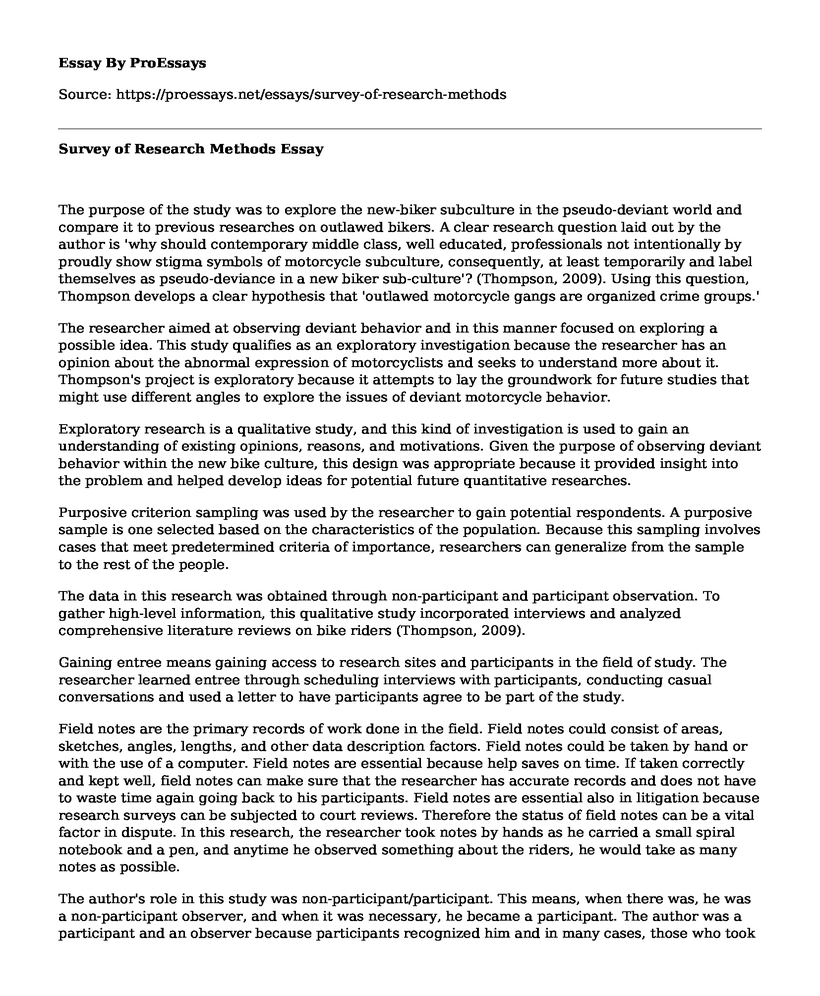The purpose of the study was to explore the new-biker subculture in the pseudo-deviant world and compare it to previous researches on outlawed bikers. A clear research question laid out by the author is 'why should contemporary middle class, well educated, professionals not intentionally by proudly show stigma symbols of motorcycle subculture, consequently, at least temporarily and label themselves as pseudo-deviance in a new biker sub-culture'? (Thompson, 2009). Using this question, Thompson develops a clear hypothesis that 'outlawed motorcycle gangs are organized crime groups.'
The researcher aimed at observing deviant behavior and in this manner focused on exploring a possible idea. This study qualifies as an exploratory investigation because the researcher has an opinion about the abnormal expression of motorcyclists and seeks to understand more about it. Thompson's project is exploratory because it attempts to lay the groundwork for future studies that might use different angles to explore the issues of deviant motorcycle behavior.
Exploratory research is a qualitative study, and this kind of investigation is used to gain an understanding of existing opinions, reasons, and motivations. Given the purpose of observing deviant behavior within the new bike culture, this design was appropriate because it provided insight into the problem and helped develop ideas for potential future quantitative researches.
Purposive criterion sampling was used by the researcher to gain potential respondents. A purposive sample is one selected based on the characteristics of the population. Because this sampling involves cases that meet predetermined criteria of importance, researchers can generalize from the sample to the rest of the people.
The data in this research was obtained through non-participant and participant observation. To gather high-level information, this qualitative study incorporated interviews and analyzed comprehensive literature reviews on bike riders (Thompson, 2009).
Gaining entree means gaining access to research sites and participants in the field of study. The researcher learned entree through scheduling interviews with participants, conducting casual conversations and used a letter to have participants agree to be part of the study.
Field notes are the primary records of work done in the field. Field notes could consist of areas, sketches, angles, lengths, and other data description factors. Field notes could be taken by hand or with the use of a computer. Field notes are essential because help saves on time. If taken correctly and kept well, field notes can make sure that the researcher has accurate records and does not have to waste time again going back to his participants. Field notes are essential also in litigation because research surveys can be subjected to court reviews. Therefore the status of field notes can be a vital factor in dispute. In this research, the researcher took notes by hands as he carried a small spiral notebook and a pen, and anytime he observed something about the riders, he would take as many notes as possible.
The author's role in this study was non-participant/participant. This means, when there was, he was a non-participant observer, and when it was necessary, he became a participant. The author was a participant and an observer because participants recognized him and in many cases, those who took part in the research knew the goals of the observer. In being a participant and an observer, there was some interaction with the participants, but the author also limited his interaction. The researcher aimed to play a neutral role as much as he could thus making him both a participant and an observer.
Internal validity in different in qualitative and quantitative research and this is because researchers in both studies use different methods to establish trustworthiness. For quantitative research internal validity is established through objectivity, reliability and external validity while in qualitative research internal validity is established using transferability, conformability, dependability, and credibility. To increase internal validity in qualitative research, verification procedures such as triangulation can be used. In this research, the author rises internal validity by incorporating a confluence of evidence to breed credibility. The numerous literature reviews on the subject provide confluent proof to show the deviance in the new breed on bikers.
Because qualitative research is more open-ended, there is no result verification as participants have more control over the data collected. With this method, the researcher is unable to verify the results. The design method makes it difficult for the researcher to investigate causality. Another methodological problem in this research is that it is time-consuming because the researcher is the only observer and therefore some observations might go unnoticed.
Employing a mixed method of research is one aspect I would use to strengthen methodology. Given the complexity of issues in research, single research design or methodology might not generate findings with sufficient detail. Using comparative effectiveness research is another approach I would use to improve the methods of my study (Sox & Goodman, 2012). Comparative effectiveness research helps in combining different study methods in complex environments. To improve on techniques, I would also incorporate other researchers to assist in result verification and to check on observations that I would have missed.
References
Sox, C,. & Goodman, N. (2012). The methods of comparative effectiveness research. Annual Review of Public Health; 33:425-445.
Thompson, W. E. (2009). 'Pseudo-Deviance and The "New Biker" Subculture: Hogs, Blogs, Leathers, and Lattes'. Deviant Behavior, 30: 1, 89-114.
Cite this page
Survey of Research Methods. (2022, Mar 06). Retrieved from https://proessays.net/essays/survey-of-research-methods
If you are the original author of this essay and no longer wish to have it published on the ProEssays website, please click below to request its removal:
- Guy-Tri Foods - Marketing Analysis Example
- Exploratory Research Example on Public Health Issues
- Evaluation Essay on Unilever Company: Dove Brand
- Evaluation Essay on LG Corporation
- IFE Matrix: Evaluating Company Strengths & Weaknesses - Free Report Sample
- Paper Example on WHA: Evaluating Strategic Options Using TOWS Matrix
- Report Example on Mixed Methods in Nursing: Exploring Chronic Pain Challenges







